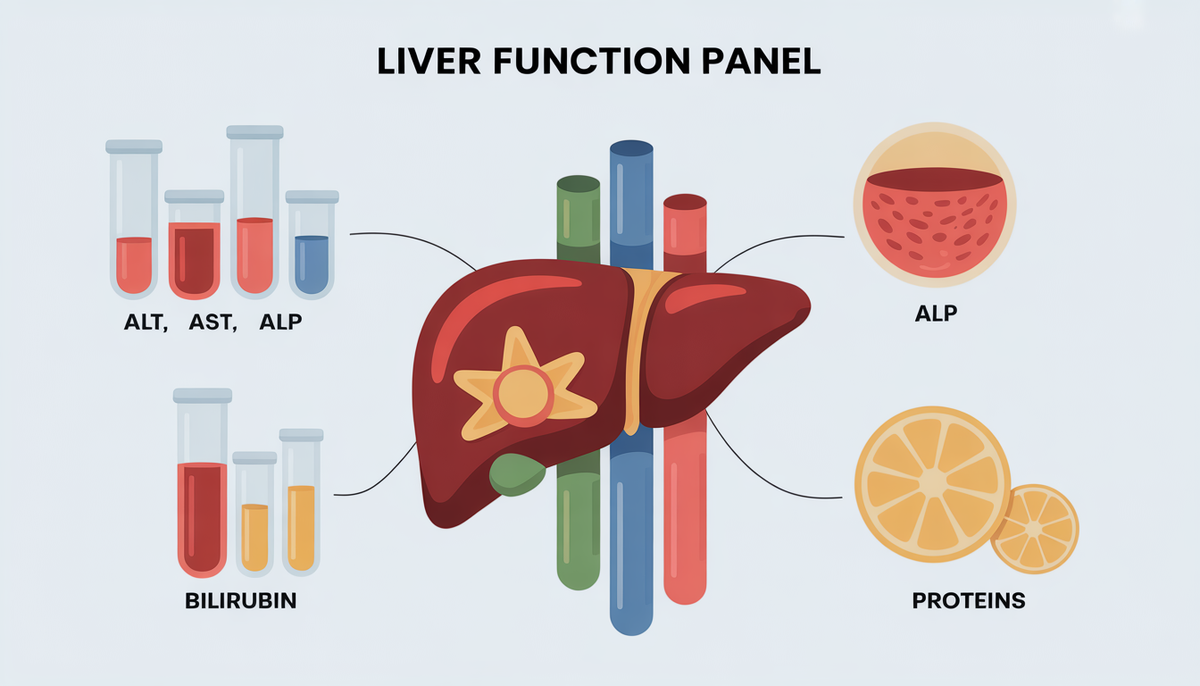
Hepatic Function Panel: Decode Liver Test Results Easily
|
|
Time to read 5 min
|
|
Time to read 5 min
```html
Written by: Brendan Gaughran
Published on August 10, 2025
Time to read 4 min
Your liver is a superstar organ, playing a crucial role in keeping you healthy. To check on its performance, doctors often suggest a liver function panel. This is a group of tests that shows how well your liver is doing its job. Since the liver is involved in digestion, detoxification, and storing energy, understanding these test results is vital for your overall health.
A liver function panel, or liver test, consists of several blood tests. These tests measure substances in your blood that indicate how well your liver is functioning. The key components of a liver function panel include:
Each test offers a piece of the puzzle, helping doctors see how well your liver is working through the hepatic function panel. Together, these results give a full picture of your liver's health.
Liver enzymes play a key role in keeping your liver healthy. They help process substances and break down toxins. Doctors often check these enzymes through a liver enzyme test to see how your liver is doing. By evaluating liver enzyme test results, doctors can determine if your liver is healthy or if there might be a problem. The liver enzyme test results are crucial for understanding your liver's condition.
You should know that a liver enzyme test is only a snapshot in time. It is picking up liver enzymes that were recently released from dying liver cells. If you have liver damage but in the few days leading up to the test were stable, you can get a false negative because those liver enzymes were not released into the bloodstream. When patients take Liver Medic's Hepatiben, for instance, the repair begins and the damage stops. If a person takes a blood test at this point, it will show no abnormal liver test results. However, there is damage; it's just not ongoing, and continuously taking Hepatiben for a 3-6 month period is advised.
Understanding liver test results can seem tricky, but it's important for your health. These tests measure substances in your blood to assess liver function. The liver panel test gives insights into how well your liver is performing.
When you get your results, it's wise to discuss them with your healthcare provider. Here are some tips for that conversation:
Understanding these results helps you and your doctor make informed decisions about your liver health.
A hepatic panel is a set of blood tests that provide a detailed view of liver health. It checks multiple factors to help doctors understand your liver's condition. This panel includes tests for:
The hepatic panel gives a full picture of your liver's health, helping healthcare providers make the best health decisions for you. A hepatic function panel test is essential for anyone concerned about their liver health, as it provides comprehensive insights into how your liver is performing.
Regular monitoring through a hepatic function panel can be a proactive step in maintaining liver health. It helps in early detection of potential issues, allowing for timely interventions. By understanding your liver test results, you can take charge of your health and work with your healthcare provider to ensure your liver functions optimally.
Your diet can greatly affect how well your liver works. Eating the right foods can support liver health. According to the British Liver Trust, here are our dietary tips as not all of the British Liver Trust tips are accurate nor are they supported by rigorous scientific evidence:
Following these tips can help keep your liver healthy. Remember, a healthy diet is key to overall well-being and supporting liver function.
Recent research has uncovered more about liver health. One area of study is the role of probiotics in liver health. Probiotics are good bacteria that can support gut health and may also benefit liver function. A review titled Probiotics and liver fibrosis: An evidence-based review of the latest suggests that these friendly microbes might help support liver health by reducing liver fibrosis, which is the thickening and scarring of liver tissue. However, if someone really wants to reduce scar tissue in their liver and regenerate healthy liver function, we suggest pairing Hepatiben with Serrapeptase, a proteolytic and fibrolytic enzyme that is very effective in supporting scar tissue reduction.
These findings offer hope and new ways to support liver health. By including probiotics in your diet, you may support your liver's natural ability to heal and function, aligning with integrative health practices.
Let's recap some key points about liver health:
Here are some actionable tips to maintain liver health: